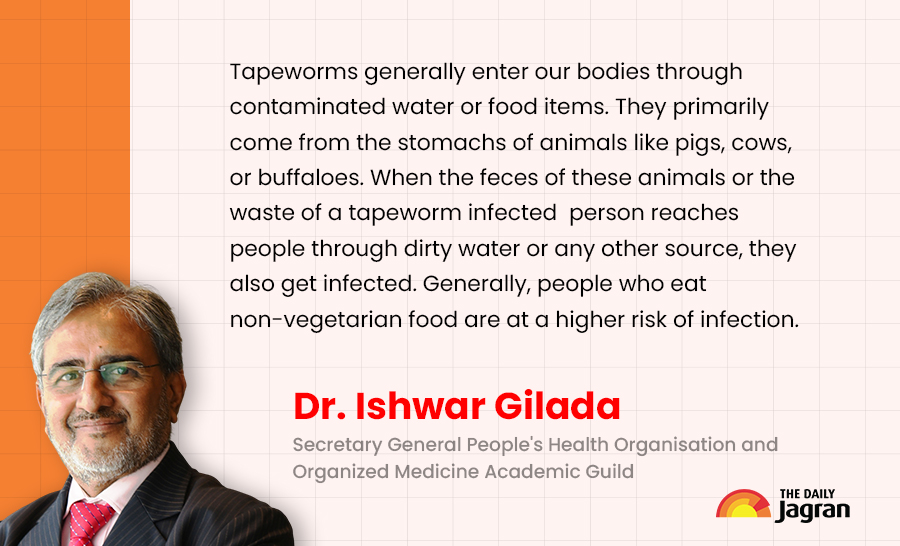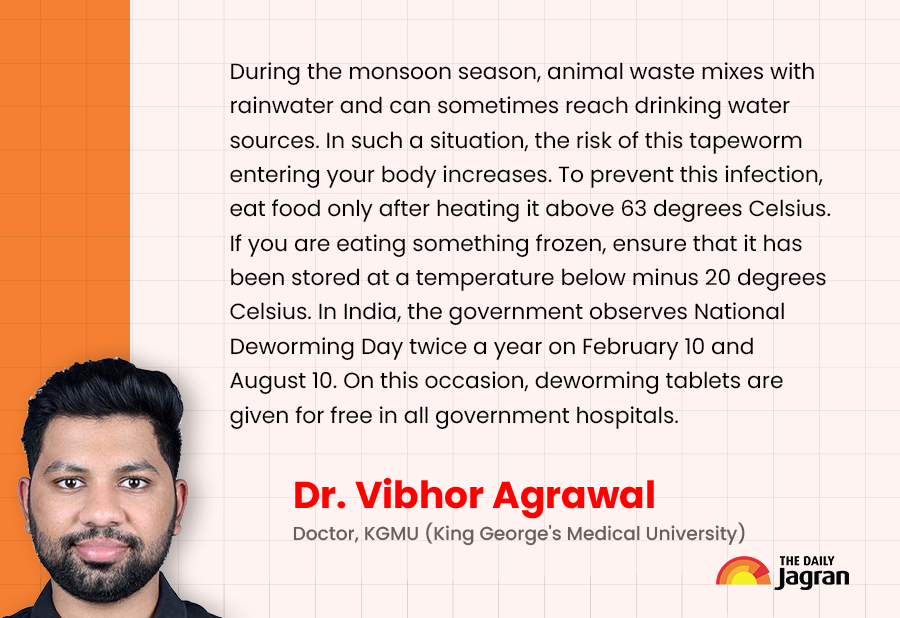- By Vivek Tiwari
- Fri, 25 Jul 2025 07:00 PM (IST)
- Source:JND
While the monsoon rains bring relief from the heat, this season also carries the risk of many water-borne and air-borne diseases. A little carelessness in this season can make you fall victim to a life-threatening illness. A hospital in Mumbai has issued an advisory stating that an increase in tapeworm infections has been observed in many parts of the country, particularly in metropolitan cities, in recent days. This parasite is reaching the brain and spreading a life-threatening disease like neurocysticercosis.
This infection spreads through contaminated food and dirty water, and symptoms include severe headaches, epileptic seizures, and even permanent mental damage. The continuous rain, waterlogging and deteriorating sanitation have made this threat more serious. We spoke with five of the country's top doctors regarding this dangerous disease.
These expert doctors say that in India, socio-economic and environmental factors create favourable conditions for the spread of tapeworm parasite infection. In a study conducted on 41,481 people by scientists from the Centre for One Health and Guru Angad Dev Veterinary and Animal Sciences University, Ludhiana, it was found that the prevalence of T. solium infection in humans was 5.21 per cent. The prevalence varied in different regions according to their social, economic, and eating habits. The highest infection rate of this parasite was found in North-East India (12 per cent) and the Southern region (8 per cent). The infection rate of this parasite was found to be higher in women compared to men.
Dr RS Mittal, President of the Founder's Committee of the Neurological Surgeons' Society of India, says that during the monsoon season, the risk of various bacterial and viral infections increases. But the risk of tapeworm infection is linked to not maintaining cleanliness and not being cautious with food and drinks. In the late 1980s, a large number of cases of tapeworms being found in people's brains were seen in Punjab. The major reason for this was that people would pluck vegetables directly from the fields and eat them raw. Today, sewage water is also used for irrigating crops across the country. This is a major reason for tapeworms to reach fruits and vegetables.
Generally, tapeworms are found in the intestines. But their eggs can reach your brain through the blood. If a tapeworm reaches the brain, it can form multiple cysts or lumps in the brain. This is called neurocysticercosis.
If the situation deteriorates significantly, brain surgery may also be necessary. If the infection is not very severe, treatment of this disease is also possible with medicines. To prevent this disease, it is essential that you avoid eating raw vegetables and eat food only after heating it thoroughly. People whose immune systems are weak, especially children and the elderly, are at a higher risk of infection from this parasite.
Dr Ishwar Gilada, Secretary General of the People's Health Organisation and Organised Medicine Academic Guild, explains that they primarily come from the stomachs of animals like pigs, cows or buffalo. When the faeces of animals or the waste of a person infected with this tapeworm reaches people through dirty water or any other source, they also get infected. Generally, people who eat non-vegetarian food are at a higher risk of this infection.
In many areas, dirty water has also started being used for vegetable farming. In such cases, tapeworms or their eggs can also reach you through green vegetables. Their eggs can reach your brain along with the blood. Therefore, take special precautions with food items and drinking water. If a person is fainting repeatedly, having epileptic seizures or losing weight, the cause could be a tapeworm. In such a case, you should go to the doctor immediately.

Neurological surgeon Dr. Subodh Raju says that in many cities, water from rivers or lakes is filtered and supplied to people for drinking. Many times, sewage water is treated and released into rivers. During the monsoon season, the risk of sewage water directly reaching clean water increases. This increases the risk of tapeworm infection. If a person has a tapeworm infection and its eggs have reached their brain, the matter becomes serious. The patient may experience frequent headaches. They might be in a state of confusion, start forgetting things, or if the eggs collect or a cyst forms on the part of the brain that controls a specific organ, that organ can be affected. Sometimes the situation becomes so serious that there is no option other than to perform brain surgery.
Narendra Saini, Chairman of the Scientific Committee of the Delhi Medical Council, says that compared to the tapeworm, its eggs are more dangerous. A few eggs entering your body can create a large number of worms.
-1753450053185.jpg)
If you frequently have gas problems, body stiffness, are losing weight, have poor digestion, or feel dizzy, you should consult a doctor. During the monsoon season, try to drink boiled water. If you eat non-vegetarian food, ensure that it is cooked thoroughly.
Dr Vibhor Agrawal from KGMU Medical College, Lucknow, says that the risk of tapeworm (Taenia solium) is lower in Indian vegetarian food. It primarily comes from non-vegetarian food. During the monsoon season, animal waste mixes with rainwater and can sometimes reach drinking water sources. This increases the risk of this tapeworm entering your body.

During the monsoon season, there is a special need to maintain cleanliness. Eat any type of food only after heating it above 63 degrees. Meanwhile, if you are eating something frozen, ensure that it has been kept at a temperature below minus 20 degrees. In India, the government observes National Deworming Day twice a year on February 10 and August 10. On this occasion, deworming tablets are given for free in all government hospitals.
(This article was translated for The Daily Jagran by Akansha Pandey.)

